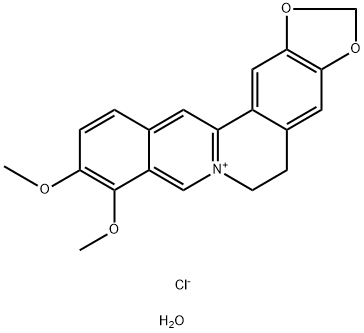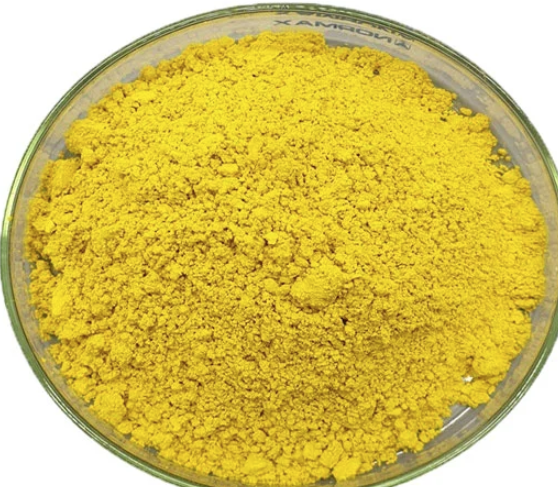| Company Name: |
Meite (Hubei) New Materials Co., Ltd
|
| Tel: |
13517221830 |
| Email: |
18802755@qq.com |
| Products Intro: |
Cas:141433-60-5
ProductName:Berberine Hydrochloride、Berberine Sulphate
Purity: 99%
|
| Company Name: |
Absin Bioscience Inc.
|
| Tel: |
021-38015121-8802 |
| Email: |
chenjw@absin.cn |
| Products Intro: |
Cas:141433-60-5
ProductName:BERBERINE CHLORIDE
|
- Berberine HCl
-

- $150.00 / 1kg
-
2025-04-22
- CAS:633-65-8
- Min. Order: 1kg
- Purity: 99%
- Supply Ability: 500kg
- Berberine HCl
-

- $0.00 / 25KG
-
2025-03-21
- CAS:141433-60-5
- Min. Order: 1KG
- Purity: 99%
- Supply Ability: 50000KG/month
- Berberine HCL
-

- $2175.00 / 25ASSAYS
-
2021-01-28
- CAS:633-65-8
- Min. Order: 25ASSAYS
- Purity: 97%
- Supply Ability: 100tons
|
| | Berberine Hcl Basic information |
| Product Name: | Berberine Hcl | | Synonyms: | 5,6-Dihydro-9,10-dimethoxybenzo[g]-1,3-benzodioxolo[5,6-a]quinolizinium chloride hydrate;Berberine chloride hydrate, 97%, water <17%;Berberine (berberine hydrochloride);9,10-DiMethoxy-5,6-dihydro-[1,3]dioxolo[4,5-g]isoquinolino[3,2-a]isoquinolin-7-iuM chloride hydrate;Berberine chloride hydrate technical, >=90% (AT);LABOTEST-BB LT00440956;CI 75160;BERBERINE HYDROCHLORIDE N-HYDRATE | | CAS: | 141433-60-5 | | MF: | C20H20ClNO5 | | MW: | 389.83 | | EINECS: | 211-195-9 | | Product Categories: | Alkaloids;Biochemistry;Miscellaneous Natural Products;Isoquinoline Alkaloids | | Mol File: | 141433-60-5.mol |  |
| | Berberine Hcl Chemical Properties |
| Melting point | 204-206 °C (dec.) | | storage temp. | Sealed in dry,Room Temperature | | solubility | DMSO (Slightly), Methanol (Slightly) | | form | Solid | | Colour Index | 75160 | | color | Pale Yellow to Yellow | | Water Solubility | Soluble in water. | | Sensitive | Light Sensitive | | Merck | 14,1154 | | BRN | 3836585 | | Stability: | Hygroscopic | | InChIKey | VKJGBAJNNALVAV-UHFFFAOYSA-M | | CAS DataBase Reference | 141433-60-5(CAS DataBase Reference) |
| Hazard Codes | Xn | | Risk Statements | 20/21/22 | | WGK Germany | 2 | | RTECS | DR9866400 | | F | 3-10 | | TSCA | Yes | | HS Code | 29399990 |
| | Berberine Hcl Usage And Synthesis |
| benefits | Berberine Hcl, a quaternary ammonium salt of an isoquinoline alkaloid and active component of various Chinese herbs, with potential antineoplastic, radiosensitizing, anti-inflammatory, anti-lipidemic and antidiabetic activities.
| | Biological Activity | Although the mechanisms of action through which Berberine Hcl exerts its effects are not yet fully elucidated, upon administration this agent appears to suppress the activation of various proteins and/or modulate the expression of a variety of genes involved in tumorigenesis and inflammation, including, but not limited to transcription factor nuclear factor-kappa B (NF-kB), myeloid cell leukemia 1 (Mcl-1), B-cell lymphoma 2 (Bcl-2), B-cell lymphoma-extra large (Bcl-xl), cyclooxygenase (COX)-2, tumor necrosis factor (TNF), interleukin (IL)-6, IL-12, inducible nitric oxide synthase (iNOS), intercellular adhesion molecule-1 (ICAM-1), E-selectin, monocyte chemoattractant protein-1 (MCP-1), C-X-C motif chemokine 2 (CXCL2), cyclin D1, activator protein (AP-1), hypoxia-inducible factor 1 (HIF-1), signal transducer and activator of transcription 3 (STAT3), peroxisome proliferator-activated receptor (PPAR), arylamine N-acetyltransferase (NAT), and DNA topoisomerase I and II. The modulation of gene expression may induce cell cycle arrest and apoptosis, and inhibit cancer cell proliferation.
| | Plant extract |
Berberine and Berberine Hcl are not the same. Berberine is a yellow-colored alkaloid found in certain plants. However, Berberine Hcl is crude berberine which has been chemically altered to become an alkaloidal salt. It may help to treat diabetes, high cholesterol, and high blood pressure, among other conditions. However, side effects can include upset stomach and nausea. Berberine has been a part of Chinese and Ayurvedic medicine for thousands of years.

|
| | Berberine Hcl Preparation Products And Raw materials |
|